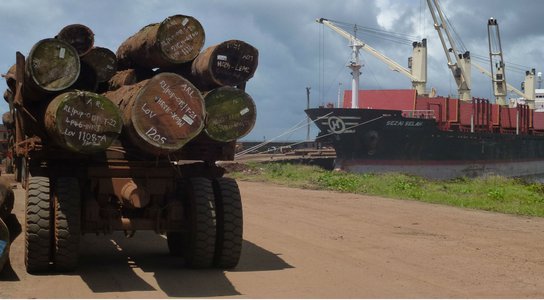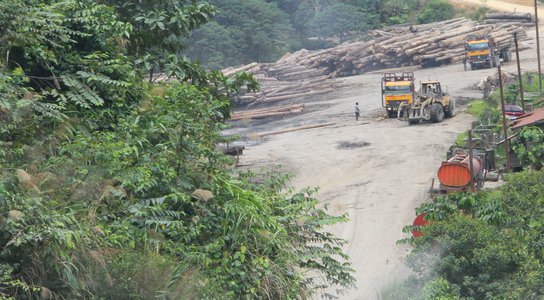European and US company executives could face fines and
even jail time for trading with Congolese logging companies accused of systematic
illegal logging and social and environmental abuses, Global Witness warns.
Our investigations into the Democratic Republic of Congo’s (DRC) €87.1 million timber trade showed that logging companies are routinely breaking forest protection laws and underpaying taxes. Two of the DRC’s biggest loggers are allegedly complicit in the beating and raping of local populations, with one company accused of complicity in the killing of a community member who took a stand against their operations.
In 2014 at least €19.8 million DRC timber entered Europe and the US, despite international trade laws aimed at keeping these markets clean. For the first time, our report – Exporting Impunity - shows where this timber is ending up.
Click here to access our digital timber tracking tool showing timber exports from DRC onto international markets.
![]()
We knew that DRC logging companies were breaking the law, but the extent of illegality is truly shocking. The EU and US are failing in their legal obligations to keep timber linked to illegal logging, violence and intimidation off our shop floors. Traders are cashing in on a multi-million dollar business that is pushing the world’s vanishing rainforests to extinction. - Alexandra Pardal, Global Witness campaign leader.
The DRC is home to two-thirds of the world’s second largest tropical rainforest. With little to no government oversight, logging companies in the DRC enjoy free reign over an area of rainforest equivalent to the size of Bulgaria, or the US State of Virginia.
Global Witness is calling on EU and US law enforcement authorities to crack down on companies that are helping fund abuses. France and Portugal are the biggest recipients of DRC timber globally after China. US, UK, Spain and Belgium each imported at least half a million euro’s worth of DRC timber in 2014.
“International traders are undeterred by the high-risk nature of DRC timber. This needs to change. EU and US authorities should enforce their laws and clamp down on this influx of illegal wood,” Pardal said. “If the international community is serious about saving the world’s last rainforests, it should stop lining the pockets of the people who plunder them.”
Under the EU’s Timber Regulation (EUTR) and the US’ Lacey Act, companies are prohibited from importing timber that breaks the laws of the producer country. In the US such violations are considered a criminal offense.
Sanctions in the EU differ by country, but in France a violation is punishable by two years’ imprisonment and a €100,000 fine. EU companies are also obliged to carry out checks on their supply chains and screen out products at risk of illegality.
We wrote to all companies we named in the report. The responses we received can be found here: Compagnie des Bois, Motema, Onatra, Sefoco, Sodefor
Click here for Global Witness' response to a statement issued by the DRC Ministry of Environment and Sustainable Development after the launch of this report.


